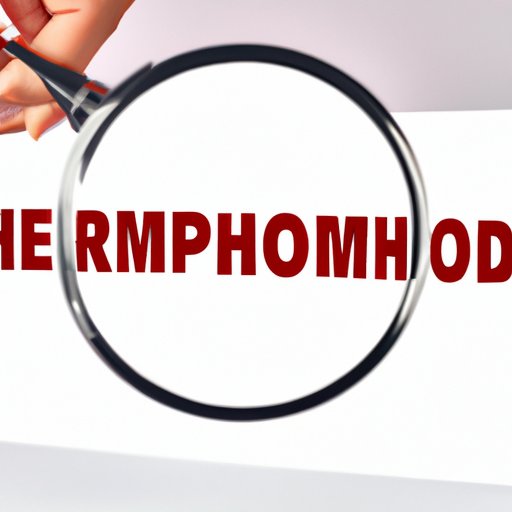
Introduction
Hemorrhoids are a common condition, but many people feel embarrassed discussing it or seeking medical attention. However, this is a manageable condition that can cause discomfort if not treated promptly. This article aims to provide an overview of hemorrhoids, types, symptoms, root causes, common treatment options, and ways to prevent this condition.
Hemorrhoids: What they are and their types
Hemorrhoids are swollen and inflamed veins in the rectum or anus area, which may cause pain, itching, or bleeding. Two types of hemorrhoids are internal and external hemorrhoids.
Internal hemorrhoids are located in the lower rectum area and may not be visible or have any symptom. However, if they become prolapsed, they can cause pain, irritation, and bleeding during bowel movements. On the other hand, external hemorrhoids are situated in the anus area and are visible or felt as a bump, causing itching, pain, and irritation.
Understanding the Symptoms of Hemorrhoids
The most common symptom of hemorrhoids is pain, particularly during bowel movements. Hemorrhoids may cause itching, discomfort, and a burning sensation in the rectum area, making it difficult to sit or stand for an extended period. Other symptoms of hemorrhoids include:
- Bleeding after bowel movements
- The presence of lumps or bumps around the anus area
- Leakage of feces
- Swelling or inflammation around the anus area
- Painful bowel movements
If you experience any of these symptoms, it is essential to seek medical attention or discuss treatment options with your healthcare provider.
Potential Causes of Hemorrhoids
Hemorrhoids are caused by various factors, including diets low in fiber, prolonged sitting, obesity, pregnancy, or straining during bowel movements. Chronic diarrhea, constipation, and dehydration can also contribute to the risk of developing hemorrhoids.
Other factors that may lead to the development of hemorrhoids include poor bowel habits, chronic coughing, or sneezing, or even genetic predispositions to the condition. Identifying the root cause of hemorrhoids is essential to prevent reoccurrence and effectively treat the condition.
Treatment Options for Hemorrhoids
There are various ways to manage and treat hemorrhoids, depending on the severity of the condition. For mild cases, certain lifestyle modifications and over-the-counter (OTC) remedies may be sufficient to provide relief. However, for severe or persistent hemorrhoids, medical or surgical intervention may be necessary.
One of the simplest and most effective ways to relieve discomfort caused by hemorrhoids is to increase fiber intake and maintain proper hydration to regulate bowel movements. Additionally, soaking in a warm bath for 10-15 minutes, two to three times a day, may help reduce swelling and alleviate symptoms.
For OTC treatment options, creams, ointments, suppositories, and pads containing hydrocortisone or witch hazel can reduce itchiness, swelling, and pain. Over-the-counter pain medications, such as acetaminophen or ibuprofen, may also be used to alleviate pain.
For more severe cases, medical or surgical treatment options include:
- Banding: a procedure where a rubber band is placed around the base of the hemorrhoid to cut off its blood supply, causing it to shrink and fall off.
- Injections: an injection of a chemical solution into the hemorrhoid to shrink it.
- Sclerotherapy: a procedure that involves injecting a chemical solution directly into blood vessels to shrink hemorrhoids.
- Hemorrhoidectomy: a surgical procedure that requires the removal of hemorrhoids, usually required for severe and persistent hemorrhoids.
It is essential to discuss your treatment options with a healthcare provider to determine the best approach for managing and treating your hemorrhoids.
Prevention and Home Remedies
There are several lifestyle changes you can make to prevent or manage hemorrhoids. These include:
- Incorporating high-fiber foods into your diet, such as whole grains, fresh fruits, and vegetables.
- Drinking plenty of water to keep your body hydrated and ease bowel movements.
- Taking breaks from prolonged sitting or standing and stretching regularly.
- Avoiding straining during bowel movements by not delaying them and maintaining regular bowel habits.
- Regularly exercising to promote bowel movement and constipation relief.
To relieve mild symptoms, home remedies can also help deal with hemorrhoids better, including:
- Applying cold compresses or ice packs to the anus area to reduce swelling and alleviate pain.
- Using moistened wipes or clean water instead of dry toilet paper to clean the anus area gently.
- Avoiding using soap or perfumed products in the anus area, which can irritate the skin.
- Applying aloe vera gel or coconut oil to the anus area to soothe irritation and reduce inflammation.
Conclusion
Hemorrhoids can cause discomfort, pain, and embarrassment, but they are treatable and manageable. If you experience any of the symptoms of hemorrhoids, it’s essential to seek medical attention immediately or discuss treatment options with your healthcare provider. Simple lifestyle changes, home remedies, or over-the-counter remedies may help alleviate mild symptoms. Still, for severe or persistent hemorrhoids, medical or surgical intervention may be necessary to treat the condition effectively.
Remember, early detection and treatment of hemorrhoids can prevent severe complications and improve your quality of life.





